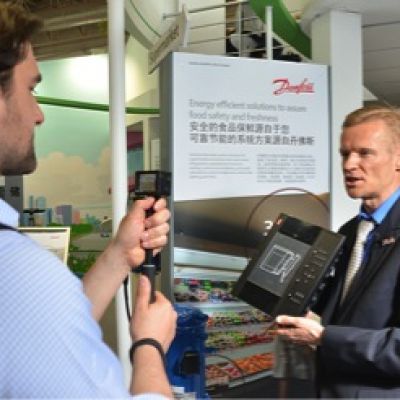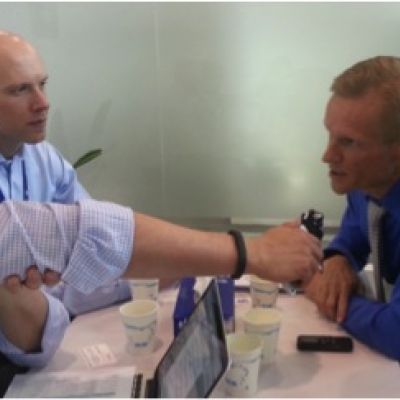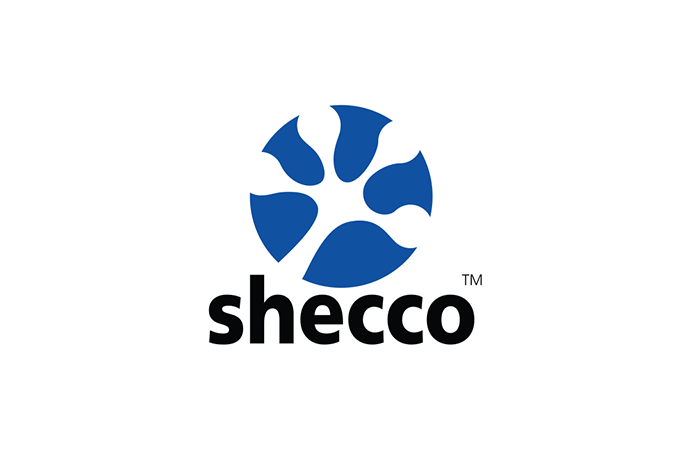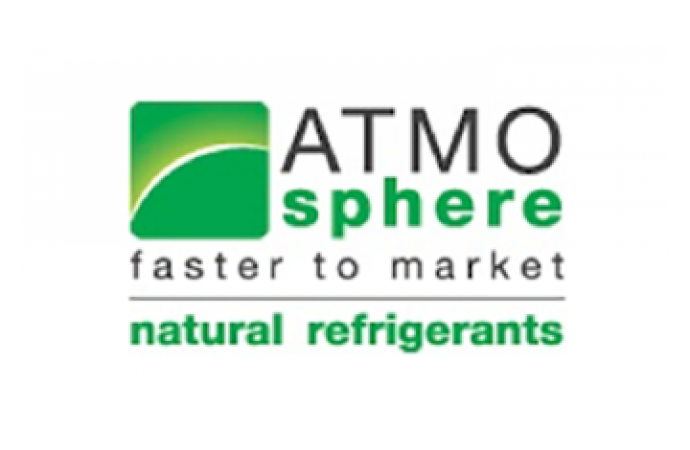At China Refrigeration 2014 ammonia21.com spoke to Christian Overgaard, Danfoss China President, in an exclusive video interview. Overgaard talks about Danfoss’s turnkey solutions for green buildings and the cold chain, which include solutions for the rapidly growing Chinese cold storage sector, ammonia safety and the impact of new legislation on f-gases. + VIDEO

ammonia21.com: What were the key themes for Danfoss at this year’s China Refrigeration trade fair?
Christian Overgaard: Danfoss’ presence at China Refrigeration 2014, employed traditional methods of promotion (booth, seminar, new products, appreciation dinner, competition etc.), to promote interaction with customers, and centred around two key areas: green buildings and the cold chain. To illustrate these focus areas, Danfoss created the storylines “comfortable living & green building” and “from farm to chopsticks”.
The first storyline describes a typical day, from the moment a person wakes up in the morning, to the time they go to sleep at night, and illustrates the fact that as China becomes more and more urbanised, demands for Danfoss products & solutions used in the ‘home’, ‘school’, ‘office’, or ‘shopping mall’ are increasing.
The second storyline is based on the cold chain, a hot topic in China, where the government has increased the cold storage capacity from 8 million tons to 18 million tons. By depicting the use of Danfoss products such as components and electronics, in food processing, cold storage, transportation, and supermarket applications, we explain how Danfoss products are helping to guarantee ‘a bite of China’.
ammonia21.com: What products did Danfoss win the innovation prize for at China Refrigeration 2014?
CO: For several years now Danfoss has been awarded the prestigious Innovation Award at China Refrigeration Expo. Danfoss was awarded the prize for the ADAP-KOOL® AK-SM 800 Series, a system manager designed to take control of the refrigeration system in the food retail sector to protect the quality of food.
ammonia21.com: What new, natural refrigerant solutions are Danfoss bringing to the Chinese market?
CO: In recent years, CO2 has become an increasingly important refrigerant in a number of applications. From an environmental and safety perspective, CO2 is one of the few sustainable refrigerants for supermarket systems. However, CO2 is not a drop-in replacement for all existing refrigerants, and its suitability for each application should be evaluated against TEWI (Total Equivalent Warming Impact) and life-time cost.
For the industrial refrigeration market the NH3/CO2 cascade system is a very effective way to lower the ammonia charge as well to increase the efficiency of the refrigeration system. CO2 is extremely efficient as a secondary fluid for medium temperature applications due to its low viscosity. As a DX refrigerant it is most efficient at low temperatures. The excellent heat transfer properties and high volumetric efficiency means that piping diameters can be reduced and heat exchange becomes very efficient.
In China, all the large-scale industrial refrigeration systems using CO2 adopt Danfoss components and solutions inside.
For the food retail market Danfoss offers complete range of CO2 system solutions including the ADAP-KOOL® control and monitoring systems, regulation and injection valves, sensors (temperature, pressure, gas detectors), filter-driers and line components. To date Danfoss components have been used in hundreds of subcritical CO2 systems and more than 1000 transcritical systems.
ammonia21.com: On 20 May 2014 the revised F-Gas Regulation, which foresees a phase down of f-gases, including bans for some sectors, was passed into law. What is your view on this legislation and the impact it will have on the HVAC&R sector?
CO: This historical decision is a potential game changer for the industry. It is a signal that policies will lean towards more climate-friendly refrigerants in the future. I believe that this decision will also encourage a market transition to natural refrigerants such as CO2 and ammonia in China. I can tell you that Danfoss, as a leader in the climate and energy industry is prepared. We have the right products and solutions.
ammonia21.com: With regards to ammonia refrigeration safety issues in China, what suggestions and recommendations do you have to promote the safe use of ammonia?
CO: With the recent rapid increase in the demand for additional cold chain infrastructure in China, the speed of cold storage construction has reached an all-time high. Due to the aggressive pace with which capacity has increased, the industry has been challenged to insure proper refrigeration system management procedures are followed and that system safety is the highest priority.
Ammonia has been successfully used as a refrigerant for many years. It is a natural, and environmental-friendly substance with excellent heat transfer characteristics, widely used in large-scale refrigeration systems all over the world. However, since ammonia is toxic, ensuring the safety of an ammonia refrigeration system through proper operation, maintenance and effective control is crucial.
There are many effective solutions to achieve a safe ammonia refrigeration system, for example through automatic controls that reduce manpower manipulation, which also helps to reduce overall operation costs. Another important point is to substitute certain technologies. An outdated pipe system can be replaced with a fan system, and an NH3/CO2 cascade system can be adopted, effectively reducing the ammonia charge in the refrigeration system.
Safety clearly matters. There is no higher priority. The safety of a refrigeration system largely depends on the design, installation and maintenance. The excellence of each specific detail is equivalent to 100% safety for the entire project. Therefore, to promote the fact that “ammonia is safe”, Danfoss is ready continue in-depth discussions and the evaluate regulations, standards and procedures in cooperation with its refrigeration industry the peers.
Thank you!
Christian Overgaard: Danfoss’ presence at China Refrigeration 2014, employed traditional methods of promotion (booth, seminar, new products, appreciation dinner, competition etc.), to promote interaction with customers, and centred around two key areas: green buildings and the cold chain. To illustrate these focus areas, Danfoss created the storylines “comfortable living & green building” and “from farm to chopsticks”.
The first storyline describes a typical day, from the moment a person wakes up in the morning, to the time they go to sleep at night, and illustrates the fact that as China becomes more and more urbanised, demands for Danfoss products & solutions used in the ‘home’, ‘school’, ‘office’, or ‘shopping mall’ are increasing.
The second storyline is based on the cold chain, a hot topic in China, where the government has increased the cold storage capacity from 8 million tons to 18 million tons. By depicting the use of Danfoss products such as components and electronics, in food processing, cold storage, transportation, and supermarket applications, we explain how Danfoss products are helping to guarantee ‘a bite of China’.
ammonia21.com: What products did Danfoss win the innovation prize for at China Refrigeration 2014?
CO: For several years now Danfoss has been awarded the prestigious Innovation Award at China Refrigeration Expo. Danfoss was awarded the prize for the ADAP-KOOL® AK-SM 800 Series, a system manager designed to take control of the refrigeration system in the food retail sector to protect the quality of food.
ammonia21.com: What new, natural refrigerant solutions are Danfoss bringing to the Chinese market?
CO: In recent years, CO2 has become an increasingly important refrigerant in a number of applications. From an environmental and safety perspective, CO2 is one of the few sustainable refrigerants for supermarket systems. However, CO2 is not a drop-in replacement for all existing refrigerants, and its suitability for each application should be evaluated against TEWI (Total Equivalent Warming Impact) and life-time cost.
For the industrial refrigeration market the NH3/CO2 cascade system is a very effective way to lower the ammonia charge as well to increase the efficiency of the refrigeration system. CO2 is extremely efficient as a secondary fluid for medium temperature applications due to its low viscosity. As a DX refrigerant it is most efficient at low temperatures. The excellent heat transfer properties and high volumetric efficiency means that piping diameters can be reduced and heat exchange becomes very efficient.
In China, all the large-scale industrial refrigeration systems using CO2 adopt Danfoss components and solutions inside.
For the food retail market Danfoss offers complete range of CO2 system solutions including the ADAP-KOOL® control and monitoring systems, regulation and injection valves, sensors (temperature, pressure, gas detectors), filter-driers and line components. To date Danfoss components have been used in hundreds of subcritical CO2 systems and more than 1000 transcritical systems.
ammonia21.com: On 20 May 2014 the revised F-Gas Regulation, which foresees a phase down of f-gases, including bans for some sectors, was passed into law. What is your view on this legislation and the impact it will have on the HVAC&R sector?
CO: This historical decision is a potential game changer for the industry. It is a signal that policies will lean towards more climate-friendly refrigerants in the future. I believe that this decision will also encourage a market transition to natural refrigerants such as CO2 and ammonia in China. I can tell you that Danfoss, as a leader in the climate and energy industry is prepared. We have the right products and solutions.
ammonia21.com: With regards to ammonia refrigeration safety issues in China, what suggestions and recommendations do you have to promote the safe use of ammonia?
CO: With the recent rapid increase in the demand for additional cold chain infrastructure in China, the speed of cold storage construction has reached an all-time high. Due to the aggressive pace with which capacity has increased, the industry has been challenged to insure proper refrigeration system management procedures are followed and that system safety is the highest priority.
Ammonia has been successfully used as a refrigerant for many years. It is a natural, and environmental-friendly substance with excellent heat transfer characteristics, widely used in large-scale refrigeration systems all over the world. However, since ammonia is toxic, ensuring the safety of an ammonia refrigeration system through proper operation, maintenance and effective control is crucial.
There are many effective solutions to achieve a safe ammonia refrigeration system, for example through automatic controls that reduce manpower manipulation, which also helps to reduce overall operation costs. Another important point is to substitute certain technologies. An outdated pipe system can be replaced with a fan system, and an NH3/CO2 cascade system can be adopted, effectively reducing the ammonia charge in the refrigeration system.
Safety clearly matters. There is no higher priority. The safety of a refrigeration system largely depends on the design, installation and maintenance. The excellence of each specific detail is equivalent to 100% safety for the entire project. Therefore, to promote the fact that “ammonia is safe”, Danfoss is ready continue in-depth discussions and the evaluate regulations, standards and procedures in cooperation with its refrigeration industry the peers.
Thank you!
GALLERY
MORE INFORMATION
Related stories



_1475587414.png)



